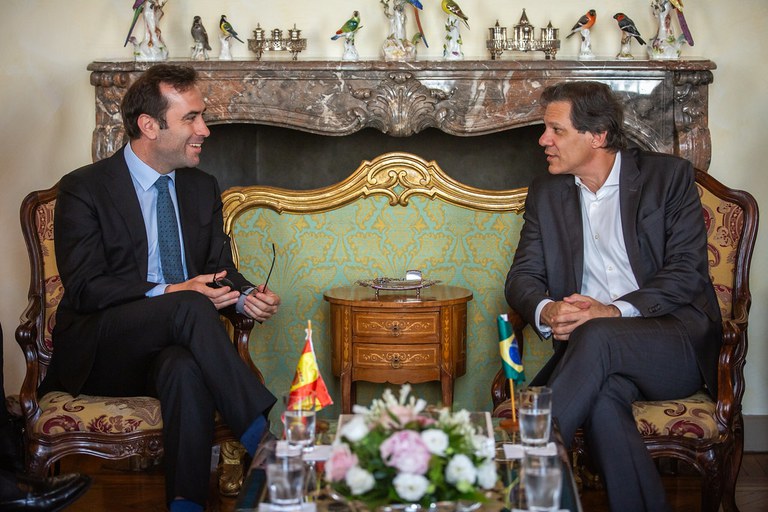Advanced cookie settings
To improve your experience on the platform and provide personalized services, we use cookies.
Notícias
INTERNATIONAL

Fernando Haddad, Finance Minister, in bilateral talks with Carlos Cuerpo, Spanish Minister of Economy, Trade, and Business - Credit: Diogo Zacarias/MF
Finance Minister Fernando Haddad and Spanish Minister of Economy, Trade, and Business Carlos Cuerpo highlighted two key initiatives during a press conference on Tuesday (4) in Rome: promoting a global tax on the super-rich during G20 discussions and advancing the Mercosur-European Union (EU) trade agreement. Both ministers emphasized that the proposal to tax the super-rich is gaining momentum, driven by the urgent need to address global challenges like eradicating hunger and poverty, alleviating the debt burden of low-income countries and combating climate change.
“We are talking about 3,000 individuals with USD 15 trillion in assets. Many of them have already expressed support for taxing the super-rich and making substantial philanthropic donations in excess of G20 recommendations," said Haddad. Although this is a Brazilian proposal that is currently under discussion at the G20, he said, this is not a new idea. It has been discussed in academic articles on economics, democracy and equality.
“The challenges under discussion will require new sources of funding, and I believe this is one of the fairest options, as it will impact a relatively small number of people. What we are discussing will affect just a few thousand individuals while benefiting billions. I think it is a reasonable proposal in terms of social, economic and political justice,” said the finance minister.
Reducing inequalities
Spain supports Brazil’s proposal of a global minimum tax on billionaires, said Cuerpo. "We must achieve growth in nominal terms, but we also need to ensure that this growth is increasingly fair and equitable and reduces the inequalities that have been on the rise in recent years," said the Spanish minister. He called for global efforts to combat hunger and improve public health.
Haddad and Cuerpo also discussed how a Mercosur-EU agreement could potentially benefit both sides. “This is an extraordinary step given current geopolitical and economic conditions, a convergence of Europe and South America,” said Haddad, highlighting the high level of goodwill among the majority of members in both blocs.
The finance minister said that the only remaining obstacle to an agreement is a "final push" to finalize negotiations that have been going for two decades. He also said that both parties have reached a point of mutual understanding and could achieve more together. He noted that the economies involved are complementary and there are significant potential gains from this partnership. He also emphasized that the objective of the agreement is not merely economic.
Cuerpo mentioned the "common willingness to continue pushing for the Mercosur-EU agreement" will focus on the advantages this process will bring to both blocs. The ministers highlighted the strong strategic partnership between Brazil and Spain, noting its potential to drive major bilateral and global initiatives.
GDP and interest rates
Asked about the 0.8% growth in Brazil's Gross Domestic Product (GDP) in the first quarter of 2024, Haddad said this result “came in strong, as forecast by the Ministry of Finance's Economic Policy Secretariat.” The he Brazilian Institute of Geography and Statistics (Instituto Brasileiro de Geografia e Estatística - IBGE) issued the economic growth figures for the first quarter on June 4. “Our first-quarter economic growth was in line with the Ministry of Finance's projections, with an emphasis on growing investments,” stated the minister.
“We maintain our yearly growth projection at about 2.5%. Indeed, most financial institutions are revising Brazil's GDP outlook upwards,” said Haddad. The minister also said that the impact of the climate catastrophe in Rio Grande do Sul on the national economy still needs to be quantified, considering that the state economy accounts for approximately 7% of the national economy.
Haddad noted that Brazil is enjoying growth with job creation and growing investment, combined with interest rates that have been on a downward trend since 2023. "Brazil can sustainably grow with low inflation," said Haddad. "We are taking action on all fronts to ensure the sustainability of the accounts and growth with low inflation," added the finance minister.
Haddad is on official visit to the Vatican and to Rome on June 4-5. His agenda includes meetings with several high-level officials, including Spanish Economy Minister Carlos Cuerpo, an audience with Pope Francis and participation in a conference on “Addressing the Debt Crisis in the Global South”, hosted by Columbia University and the Pontifical Academy of Social Sciences.
